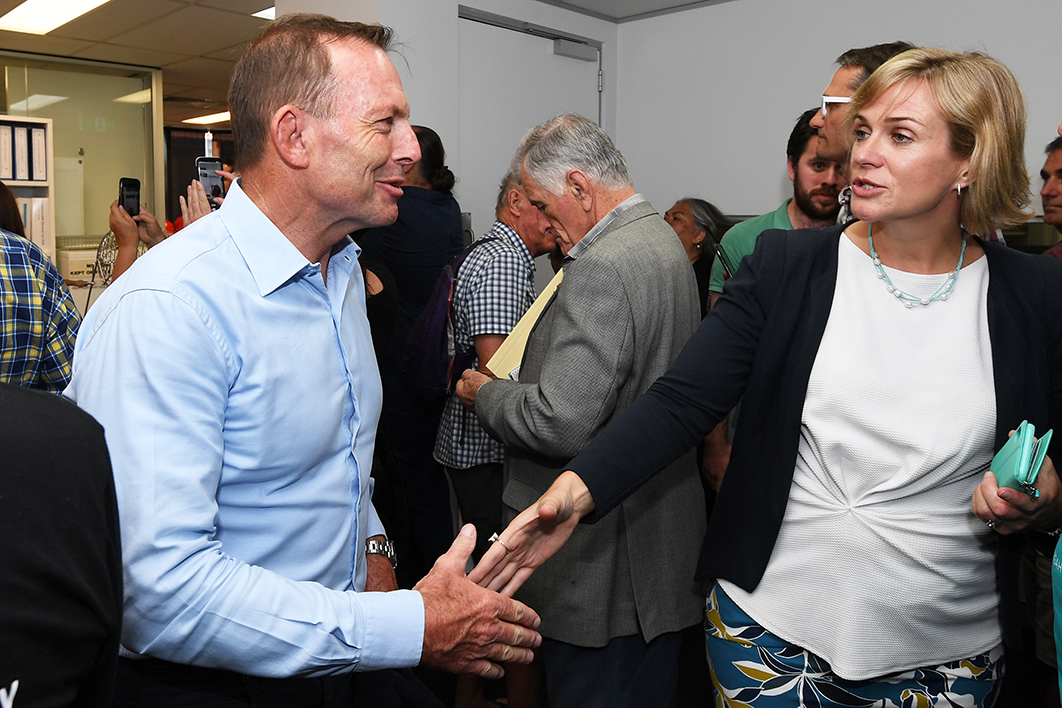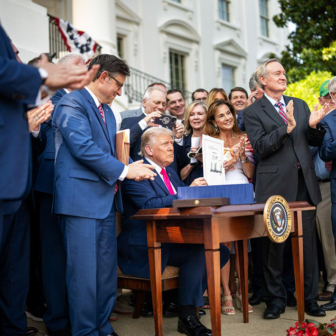I returned to Warringah fifteen years ago, having last lived in the seat in the 1960s. Back then I didn’t know it was Warringah: a relatively recent arrival from America, I hadn’t taken out citizenship and, sad to admit, didn’t know one federal seat from another. Living in Balgowlah, though, I was right in the heart of the electorate, and since I’ve returned I’ve seen remarkable changes. For one, the standard of living has soared; for another, a more cosmopolitan populace has replaced the relentlessly Anglo-Celtic one. I used to make cheesecakes for a North Sydney restaurant to fund my university degree, and one day I went up and down the northern beaches searching for sour cream, only to be told everywhere, “I’m sorry, madam. All our cream is fresh.”
Yet you could easily argue that the more things change here, the more they stay the same. If its population has grown, its geographical size is much as it was in 1922, when the division was created. And in all that time, coming up for a century, while its socioeconomic status has waxed and waned, Warringah has sent conservatives to federal parliament.
Take the suburb I now live in. In the 1960s Manly was almost exclusively white lower-middle class or working class. Suburbs to the north — like Frenchs Forest, where the current sitting member lives (although, since a recent boundary change, he now resides in the seat of Mackellar) — were what we now call aspirational. Couples built homes there to raise families in and to gain a foothold, or maintain one, in a more solid middle class, though it was generally accepted that those suburbs would never attain the prestige of Mosman.
But even then Manly was special. It had a raffishness to it, which was what I loved about it. I could never understand why people didn’t rush to live there. Ocean on one side, harbour on the other, a half-hour ferry to the city. (Part of the problem was the sewage, which until the early 1990s ran untreated into the sea.) Few of the grander edifices built in the 1920s remained and the ones that did had the air of old courtesans who had seen better days. (The one I live in these days was divided into smaller flats during the Depression and the war, and only recently was substantially renovated.)
The very things that attracted me in the sixties have since drawn a fascinating mix of wealthy retirees, singles of all nationalities, and savvy young professionals. (And, of course, the tourists.) On my daily visit to the shops I am treated to a smorgasbord of language — Spanish, Portuguese, Swedish, French, Italian, Russian, Polish, Arabic, Thai and Chinese. And if the food isn’t up to inner-west standards, there’s certainly plenty of it. (In fact, that’s about all there is now that gentrification has banished the ferris wheel, the water slide and, most painful of all, our cinema.)
It’s fair to say that Tony Abbott hasn’t quite digested all this change. Nor the significance of the prams. The welter of surveys, polls and focus groups have merely confirmed what’s been right in front of my eyes for years. Warringah, Manly especially, is experiencing a population explosion. It’s the reason I carry my walking stick with me, what with the two-year-olds on scooters, mothers jogging along the beachfront pushing their leviathan strollers and talking on their mobile phones, and kids of all ages on skateboards, not to mention the bikes.
Last year, before Christmas, GetUp! came to town. I attended its first public meeting at the senior citizens’ centre, where a crowd of nearly 700 turned up. Later I went on an early door-knock. The street my partner and I were assigned to is in the heart of Balgowlah. Back in the day, this area was resolutely lower-middle-class conservative, Tory even. As we emerged from the bus, I glumly warned our inner-west team leaders not to expect much of a welcome here. How wrong I was. The street was full of kids, and their parents were having a street party. Every single person we talked to nominated climate change as his or her concern — because of the kids. If he knows this, Tony Abbott could be forgiven for panicking.
Not only that, but no fewer than six grassroots groups had popped up with the shared objective of kicking him out. T-shirts and shopping bags emblazoned with Vote Tony Out appeared; people went on Sunday walks wearing them, along Manly’s beachfront and down the Corso; in Mosman, people did the same on Balmoral Beach. Rumours swirled about candidates, the ideal being an independent with a profile and sufficient draw power to galvanise the electorate. (Greens and independents have had a presence here; Labor, though, has been notable for its effective absence.)
Jane Caro put her toe in the water, then withdrew, fearing she was too left for Warringah. For a while the word was that Layne Beachley, the beloved champion surfer, Manly’s own, would be running, but that proved a furphy. Susan Moylan-Coombs, Nugget Coombs’s granddaughter, came forward, a fantastic candidate but like Caro maybe too progressive for this electorate. Labor’s Dean Harris, highly commendable, had been quietly campaigning for months, but again, his chances seemed negligible, as did Kristyn Glanville’s for the Greens. Then, in the new year, whispering began about the perfect contender, willing, able, and waiting for the moment to strike.
It’s a measure of my oddity — well past sixty, not the least concerned about franking credits though interest rate cuts have drastically reduced my income — that I had never heard of Zali Steggall. My ignorance didn’t last long, however. I was quickly persuaded that if anyone had a chance of ousting the sitting member it was her. On climate change she is excellent (matching the Greens on Adani, for instance, and far better than Labor). Resentment towards Abbott runs high on this issue, particularly among moderate Liberal voters; for them the former Olympic skier has appeal, and not just for her slalom form. And it’s recognised that her election, or anyone’s, depends on these disaffected Liberals.
Still, that old saw about the Coalition being great economic managers dies hard here. So Steggall has decided not to fight on that issue, though she’s smart enough to realise it’s open to debate. She won’t go near Labor’s proposed reforms to negative gearing, capital gains or franking credits, claiming they’re too divisive. She’s pitching to the “sensible centre,” where moderate Liberals have wanted to be ever since Abbott started raving against the “carbon tax,” axed it on becoming prime minister, and thus pushed Australia’s emissions back onto their rising trajectory.
With an old injury playing up, I decided not to do any more doorknocking, choosing instead to sign up for Steggall’s letter-writing campaign. I was impressed with the range of political experience represented on the committee. (And that’s not even counting the woman who asked if I was the Sara Dowse and declared she had read every one of my novels; until that heady moment I wouldn’t have believed such people existed in Warringah.) We were handed sheets with email addresses of editors and samples of printed letters, and discussed how our letters were not to be negative or too long and complicated.
What I learned in the days that followed was just how hopeless I was at the job. It’s impossible to get a letter to the Telegraph or the Australian unless you subscribe to them or send it by snail mail (which I did, unsuccessfully). Though the two local dailies, in Mosman and Manly, are also Murdoch-owned, the letters they printed were a surprisingly even-handed selection and better than anything I could write.
The Manly Daily was also on hand for a meeting of close to one hundred volunteers in the home of one of Steggall’s supporters. After she spoke — announcing that volunteer numbers electorate-wide had reached 1000, a genuine achievement for a first-time independent candidate — we positioned ourselves for the camera. The Daily’s cameraman climbed onto a ladder, perilously close to the balcony edge, to fit us all in. Then, for a spectacular wide shot, he used a drone, the shot with us all in our turquoise t-shirts appearing in the paper’s Saturday edition.
About one hundred people also showed up to hear Abbott address the Manly Community Forum, where Steggall had spoken in March. A fair few were Abbott supporters, but many were not, and, along with the Dorothy Dixers, he faced tough questions. A woman next to me stood up, notebook shaking, and asked what he was going to do about the dishonesty and misogyny of his campaign. This was in the wake of a couple of public displays by the right wing’s rather cack-handed answer to GetUp!, Advance Australia, which first sent two trucks roaming the streets with huge signs showing Steggall next to a malevolent-looking Shorten, and then released a video of a randy Captain GetUp rubbing against her picture.
Abbott absolved himself, naturally enough, differentiating his own campaign from that of Advance Australia. (There’s been a constant, false assertion that Steggall is funded by GetUp!.) With every rejoinder his claqueurs applauded, but from the sound of it they weren’t much more than a third of the audience. To my question about the cuts to the ABC, the National Library and services like women’s refuges, he said that the ABC was better off with the cuts and, citing his visits to Sky News, much better appointed than the commercial broadcasters. As for the shelters, he referred to the money he raised for the Manly one on his Pollie Pedal rides. Pure Abbott, but scarcely his shining hour.
To garner sufficient support for his re-election, Abbott is throwing all his weight behind “the tunnel.” This is the proposed alternative to the Spit Bridge, currently the only, heavily clogged connection between the northern beaches and the city. The idea has been bobbing up and down for a while, and for its supporters it’s something like a cargo cult. But it’s hardly uncontroversial. Opponents are alarmed by the prospective air vents and their consequent pollution; Balgowlah would be affected and its golf course could go. Rather than decreasing congestion, traffic experts say that it’s likely to increase it, attracting ever more buses, trucks and cars. Steggall’s okay with it, as long as it’s restricted to electric-powered public transport and electric-powered cars.
Meanwhile, the campaign gets dirtier. Steggall’s posters are defaced or pulled down. Her ex-husband and second wife, caught on Twitter accusing her of rampant ambition, were forced to delete the tweets after they backfired and sympathy for her grew. As I write we learn that the North Manly banner with Vote Tony Out was torn down and its last word painted over. But Steggall insists on “going high as they go low.” She may be right, but it’s scary. Her odds have slipped on Sportsbet, which could mean Advance Australia’s stunts are working. My spirits lifted, however, when someone on Facebook dubbed them, accurately enough, Regress Australia. It doesn’t sound much like what the voters I spoke to in Balgowlah are looking for. •




